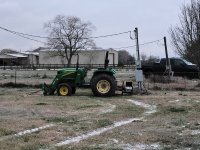JP_Austin
New member
Ive been looking into the same stuff lately. You need approximately 2HP at the PTO per killowatt of power produced. The OP said they had a Mitsubishi 180D and that has about 15.5 hp at the PTO. That means the most power you can expect to get is about 7.5KW of power. Not a lot and certainly not even close to the 15KW they desire. As far as matching the torque curve to the ratio... Will help but only slightly. One setting you will have more parasitic loss and another setting will be less parasitic loss. Still I'd be surprised if you produced over 7.5KW at the end of the day.
In my case I have 60HP at the PTO. I sized the genset for 31KW. I could purchase a 50KW version but I won't have the tractor to spin it to that level.
In my case I have 60HP at the PTO. I sized the genset for 31KW. I could purchase a 50KW version but I won't have the tractor to spin it to that level.
